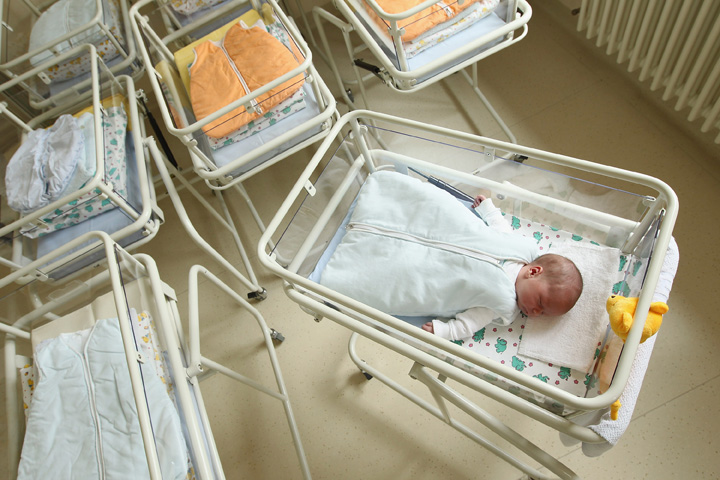TORONTO — Logan Irvine is four years old. He loves Mickey Mouse, eating pizza, playing soccer, and watching hockey. He roots for the home team — the Ottawa Senators — and as a devoted fan, he can pick team captain Daniel Alfredsson out in a crowd.

Logan is graduating from junior kindergarten this month. He sounds like most little kids, but the strong, resilient boy has had three heart surgeries.
The procedures are marred by hospital stays to ensure Logan, and all patients who face surgical procedures, is nursed to recovery.
Now, new research out of the Children’s Hospital of Eastern Ontario is shedding light on the value of vitamin D and its role in recovery to help kids with congenital heart disease get home from hospital faster.
While it’s been well established that vitamin D is vital for growing bones, in recent years the scientific community has posited that it may be important for the health and daily functioning of our organs.
In the new study, pediatrician and researcher Dr. Dayre McNally suggests vitamin D deficiencies may be hurting recovery for kids and adult patients alike.
And with his findings in tow, McNally says patients could benefit from maintaining their vitamin D levels and even building it up pre-operation so they’ll have a stronger recovery following their procedure.
Read more: Toronto hospital launching landmark study following pregnant women and their babies
“If we help them prepare ahead of time and optimize their vitamin D status, we can prevent their post-operative vitamin D deficiency and that will help their heart, lungs and immune system cope with surgery and the stress following it,” McNally told Global News.
- Jasper mayor says CN Rail relocation will be devastating: ‘Deeply disappointed’
- Retired Quebec teacher buys winning lottery ticket at last minute, wins $40M
- N.B. election: Higgs went to ‘very dark place’ with Liberal joke, opponent says
- GM, Volvo, Land Rover vehicles among those in big recall. What to know
“Then they would recover faster.”

Get weekly health news
Vitamin D pre- and post-operation
In his study, McNally looked at 58 children who had cardiac surgery at CHEO. Blood was collected pre- and post-surgery.
Results showed that pre-op, almost all of the kids had “borderline acceptable” levels of vitamin D — which is akin to the general population. But post-operation, their levels were near depleted at another 40 per cent decrease.
McNally said the steep drop is because doctors rely on a heart-lung machine to keep pumping blood during surgery. It seems to strip vitamin D from the body.
“Maybe while saving patients’ lives, we could be making their vitamin D levels low,” he explained.
Those patients with lower vitamin D levels end up taking more medications or they need to rely on breathing machines. They also had longer stints in intensive care units.
The key is to make sure candidates for surgery have healthy levels of vitamin D prior to their procedures. After the operation, it’s too late. They battle bouts of critical illness — it could take months to restore vitamin D levels.
Read more: Children’s cancer wing transforms into superhero ward offering ‘superformula’ chemotherapy
For Logan’s father, Graham, the findings offer some hope.
Logan was born about two months premature with a rare condition called tetralogy of fallot, which consists of four heart abnormalities. He also had pulmonary atresia — when one valve is missing or doesn’t open.
Within his first week of life, he had to undergo his first heart surgery to save his life. At six months, he spent another two weeks in hospital for more procedures. And in August 2011, he had open heart surgery to replace valves and tissues.
While Logan has healed, his past three surgeries were not a permanent fix.
The elder Irvine says that Logan will encounter more of these heart procedures in his lifetime to replace heart valves.
If McNally’s findings help to cut down recovery time, Irvine says his family would be thrilled.
“If this could potentially help him recover faster, which means not being in the ICU and recovery ward that long, it would be great news,” Irvine said.
A wider scope
About two per cent of the population has congenital heart disease but McNally told Global News that his findings extend to a wider scope, too.
He says there are parallels between this study and other procedures — dialysis and blood exchange, for example.
“I don’t think we fully understand how all of these ICU and surgical interventions affect vitamin D levels in these populations. While I can only comment directly on children, I am pretty sure this is happening in other groups,” he said.
Read more: Preschoolers’ eating habits linked to future heart health risks, Canadian study says
McNally said he hopes to look at other vitamins and hormones, their levels pre- and post-surgery and their role in recovery time.
He’s also received grant money from the Heart and Stroke Foundation to determine what dosage of vitamin D children would need to be at optimal health to bounce back from surgery.
Ultimately, McNally’s findings could offer recommendations to take vitamin D before surgery.
carmen.chai@globalnews.ca
Follow @Carmen_Chai








Comments